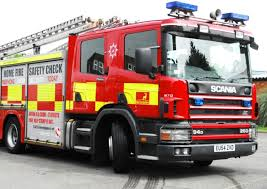
Firefighters in Watford and Stevenage could now be first on the scene if someone calls 999 for an ambulance.
Hertfordshire County Council’s Fire and Rescue Service, together with other Fire Services across the Eastern region, are working with East of England Ambulance Service Trust (EEAST) to attend 999 calls involving cardiac arrests as part of a pilot scheme.
The pilot has been set up because successfully treating cardiac arrest patients greatly depends on getting help to them as quickly as possible. From May, when a 999 call is made to the ambulance service about a cardiac arrest in the Watford or Stevenage areas, their control room will send either paramedics or firefighters to attend, depending upon who is nearest, so that emergency care is given as quickly as possible.
Roy Wilsher, Chief Fire Officer and Director of Community Protection, said: “Firefighters are trained to provide immediate emergency care and we already carry trauma kits and defibrillators on our fire engines. It makes sense for us to use these life-saving skills to support the ambulance service in situations where we can get to a patient more quickly.
“We already work closely with the ambulance service at incidents and we even share stations in some areas so this pilot is a natural evolution of that collaboration. We aren’t trying to turn firefighters in to paramedics, it’s about making the best use of the emergency services capabilities, regardless of which uniform they wear.”
Rob Ashford, Acting Director of Service Delivery for EEAST, said: "We already work closely with 999 colleagues and this is an extension of our partnership to help patients with an immediately life-threatening condition. Building on the collaborative work already undertaken through community first response (CFR), public access defibrillation and RAF co-response schemes, we also believe co-response schemes can add significantly to our ability to respond to patients quickly and start basic life support. We know that the quicker someone starts cardiopulmonary resuscitation (CPR) and gets a defibrillator to a patient in cardiac arrest the better chance they have of surviving."
The pilot will not affect the fire service’s ability to attend fires, road traffic collisions and other serious incidents in these areas but adds another life-saving service to those they already provide. Both Stevenage and Watford have two full-time fire engines and the pilot has been set up to identify the impact, if any on Fire Service emergency response. Firefighters will not convey casualties to hospital but offer trauma care at the scene until an ambulance arrives.
Twenty fire and rescue services around the country are already successfully working with their local ambulance services and the fire and rescue services in Bedfordshire, Hertfordshire, Essex, Suffolk, Cambridgeshire and Norfolk are taking part in this pilot with EEAST, which is intended to run for six months.


 Home Instead Launches ‘Spot The Signs’ Campaign to Raise Dementia Awareness.
Home Instead Launches ‘Spot The Signs’ Campaign to Raise Dementia Awareness.
 The Top Five Films and TV Shows to Watch this Week (7th - 11th July 2025)
The Top Five Films and TV Shows to Watch this Week (7th - 11th July 2025)
 The Top Five Films and TV Shows to Watch this Week (30th June - 4th July 2025)
The Top Five Films and TV Shows to Watch this Week (30th June - 4th July 2025)
 Interview with Proud Watford Co-Founder Lee Keogh
Interview with Proud Watford Co-Founder Lee Keogh
 The Top Five Films and TV Shows to Watch this Week (23rd - 27th June 2025)
The Top Five Films and TV Shows to Watch this Week (23rd - 27th June 2025)
 The Top Five Films and TV Shows to Watch this Week (16th - 20th June 2025)
The Top Five Films and TV Shows to Watch this Week (16th - 20th June 2025)

